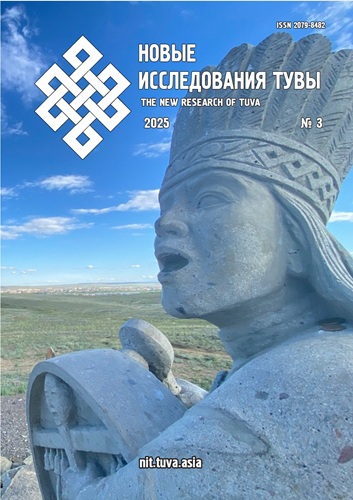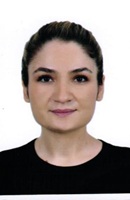Types of nominations in modern Kazakh short story
DOI:
https://doi.org/10.25178/nit.2025.3.12Keywords:
nomination; Kazakh prose; Kazakh short story; proper name; metaphorical name; relational name; personal name; sacred name; mythological nameAbstract
The article identifies and analyzes various types of naming in contemporary Kazakh short stories: metaphorical names, relational names, personal names, as well as sacred and mythological names. The source base of the study includes stories by writers Talasbek Asemkulov “The Old Kui Player”, Alibek Askarov “Mona Lisa”, Zhusipbek Korgasbek “Art”, and Beksultan Nurzhekeev (Nurzheke-uly) “The Death of the Soul”.
It is noted that the authors use metaphorical naming based on comparisons between close individuals and culturally sacred animals, such as the horse, which holds a special place among Kazakhs and other Turkic peoples. Relational names may function as etiquette-based nominations of literary characters. This type of nomination reflects the value of close kinship ties in Kazakh culture and the respectful attitude toward outsiders.
Personal names of literary characters carry semantic links to natural phenomena and often belong to a subgroup of names associated with fauna. Sacred and mythological names preserve the cultural memory of the people, reflecting their ethical, moral, and religious beliefs. These include the names of legendary ancestors, saints, and demonic entities. This category of nominations leads the reader toward religious and mythological contexts.
References
Akatay, S. N. (2011) Ancient Cults and the Traditional Culture of the Kazakh People. Almaty, Print-Express. 424 p. (In Russ.)
Altybayeva, S. M. (2018) Kazakh Prose of the Independence Period: Tradition, Innovation, Prospects. Almaty, Gylym. 440 p. (In Russ.)
Amanbayeva, G. Yu. and Ashirbekova, G. N. (2010) Mental Conceptional Sphere as an Object of Comparative Research. Vestnik Karagandinskogo universiteta. Seriia «Filologiia», no. 4 (60), pp. 15–18. (In Russ.)
Arutyunova, N. D. (1977) Nomination and the Text. In: Linguistic Nomination (General Issues), eds. B. A. Serebrennikov, A. A. Ufimtseva. Moscow, Nauka. 359 p. Pp. 303–357. (In Russ.)
Ayazbekova, S. Sh. (2011) The Worldview of the Ethnos: Korkut Ata and the Philosophy of Kazakh Music. 2nd ed. Astana, Baspa–AS. 284 p. (In Russ.)
Baktybayeva, A. T. (2023) Means of Conveying the Comic in the Modern Kazakhstani Novel (on the Example of the Work by D. Satpayev and E. Zhumagulov “The Legend of NOMENCLATURE”). Mir russkogovoriashchikh stran, no. 3 (17), pp. 115–127. (In Russ.) DOI: http://dx.doi.org/10.20323/2658_7866_2023_3_17_115
Baigut, D. N. and Baigut, A. M. (2014) Lacunae in Kazakh Linguoculture: Specifics of Family-Kinship Relations. Science and World, no. 7 (11), pp. 45–47. (In Russ.)
Bakhtin, M. M. (1996) The Problem of Speech Genres. In: Bakhtin M. M. Collected Works. Moscow, Russkie Slovari. Vol. 5: Works from the 1940s–1960s. 731 p. Pp. 159–206. (In Russ.)
Bezertinov, R. N. (2006) Ancient Turkic Worldview “Tengrism”. Kazan, RIC “School”. 164 p. (In Russ.)
Bulgakov, S. N. (1999) Philosophy of the Name. In: Bulgakov, S. N. Philosophy of the Name. The Icon and Icon Veneration: Works: in 2 vols. Moscow, Iskusstvo; St. Petersburg: Inapress. Vol. 2. 438 p. Pp. 13–240. (In Russ.)
Vinogradov, V. V. (1971) On the Theory of Artistic Speech. Moscow, Vysshaia Shkola. 240 p. (In Russ.)
Gak, V. G. (1977) Toward a Typology of Linguistic Nominations. In: Linguistic Nomination (General Issues), eds. B. A. Serebrennikov, A. A. Ufimtseva. Moscow, Nauka. 359 p. Pp. 230–293. (In Russ.)
Golikova, T. A. (2013) Psychology of Choosing a Personal Name Among Turkic Peoples. Nauchnyi Dialog. Psikhologiia. Pedagogika, no. 9 (21), pp. 21–31. (In Russ.)
Ibraeva, Zh. B. and Saparova, A. Zh. (2019) Kazakh Literature in the Independence Period. Vestnik Innovatsionnogo Evraziiskogo universiteta, no. 3, pp. 24–28. (In Russ.)
Kairbekov, B. G. (2014) The World of Nomadism. Myths of the Great Steppe. Kazakh Etiquette. Astana, Kazakh Scientific Research Institute of Culture. 255 p. (In Russ.)
Karasik, V. I. (2002) The Linguistic Circle: Personality, Concepts, Discourse. Volgograd, Peremena. 472 p. (In Russ.)
Kaskabasov, S. A. (1990) Kazakh Non-Fairy Prose. Alma-Ata, Academy of Sciences of the Kazakh SSR, M. O. Auezov Institute of Literature and Art. 240 p. (In Russ.)
Kasymzhanova, A. A., Askarova, R.K. 2021. Ageing in Kazakh Culture: A Psychological Analysis of Factors of Gerotranscendence. Vestnik KazNU im. al-Farabi. Seriia Psikhologiia i sotsiologiia, no. 3 (78), pp. 44–55. (In Russ.)
Kasymova, O. P. and Sarsenbayeva, Z. S. (2020) Phraseological Representation of the Linguocultural Concept “Woman” in Russian and Kazakh. Vestnik Bashkirskogo universiteta, no. 4, pp. 865–869. (In Russ.)
Kozhevnikova, N. A. (2009) On Metaphorical Nomination of Characters in Literary Texts. In: Kozhevnikova N. A. Selected Works on the Language of Fiction. Moscow, Znak. 896 p. Pp. 613–620. (In Russ.)
Koltsova, L. M. and El-Msafer, Kh. A. (2015) The Words “Genie” and “Devil” through the Eyes of Russians and Arabs. Vestnik Voronezhskogo gosudarstvennogo universiteta. Seriia: Filologiia, no. 2, pp. 32–36. (In Russ.)
Kubryakova, E. S. (1977) Theory of Nomination and Word Formation. In: Linguistic Nomination (Types of Names), eds. B. A. Serebrennikov, A. A. Ufimtseva. Moscow, Nauka. 356 p. Pp. 222–303. (In Russ.)
Kuldeeva, G. I. (2001) The Anthroponymic System of the Modern Kazakh Language. Kazan, DAS. 239 p. (In Russ.)
Kukharenko, V. A. (1988) Text Interpretation. Moscow, Prosveshchenie. 192 p. (In Russ.)
Larina, T. Yu. and Milevskaya, T. V. (2015) The Role of Proper Names in the Formation of a Coherent Text (Based on the Novels Twelve Chairs and The Golden Calf by I. Il’f and E. Petrov). Vestnik Volgogradskogo gosudarstvennogo universiteta. Seriia 2. Yazykoznanie, no. 5 (29), pp. 114–119. (In Russ.)
Lipatova, A. P. (2023) Variability of the Proper Name in F. M. Reshetnikov’s Nikolai Znamensky as a Means of Creating an Artistic Image. Voprosy onomastiki, vol. 20, no. 2, pp. 270–287. (In Russ.)
Lotman, Yu. M. (1992) The World of Proper Names. In: Lotman Yu. M. Culture and Explosion. Moscow, Gnozis; Progress Publ. Group. 272 p. Pp. 52–63 (In Russ.)
Losev, A. F. (2016) Philosophy of the Name. St. Petersburg, Oleg Abyshko Publ. House. 672 p. (In Russ.)
Meirmanova, G. A. (2007) Communication Culture Among the Kazakhs: Etiquette of Greeting and Farewell. Etnograficheskoe obozrenie, no. 6, pp. 105–115. (In Russ.)
Melgunova, A. V. (2014) Variability of Nominations in Literary Text. Vestnik Leningradskogo gosudarstvennogo universiteta im. A. S. Pushkina, vol. 1, no. 4, pp. 117–123. (In Russ.)
Sagautdinov, Sh. Sh. (2011) Tatar Names: Origins, Meanings, Examples. Almaty, s. n. 569 p. (In Russ.)
Sabyrzhanova, M. S. and Ananjeva, S. V. (2024) Turkic Mythology in E. Tursunov’s Story “Kelin”. New Research of Tuva, no. 3, pp. 289–301. (In Russ.) DOI: https://doi.org/10.25178/nit.2024.3.17
Soyan, A. M. (2023) The Image of the Horse in Tuvan Riddles. New Research of Tuva, no. 3, pp. 84–96. (In Russ.) DOI: https://doi.org/10.25178/nit.2023.3.6
Sultan, E. (2021) Modern Kazakh Novels: Genre Transformation. Keruen, vol. 71, no. 2, pp. 55–61. (In Russ.) DOI: https://doi.org/10.53871/2078-8134.2021.2-01
Temirbolat, A. (2023) Features of Kazakh Prose Development during the Independence Period. Keruen, vol. 78, no. 1, pp. 24–38. (In Russ.) DOI: https://doi.org/10.53871/2078-8134.2023.1-02
Temirgazina, Z. K. and Aselderova, R. O. (2022) Complex Kazakh Anthroponyms with a Verbal Component. Voprosy onomastiki, vol. 19, no. 2, pp. 48–65. (In Russ.)
Toktabay, A. U. (2004) The Cult of the Horse Among the Kazakhs. Almaty, KazIzdat-KT. 124 p. (In Russ.)
Tuimebayev, Zh. K., Kikbayeva, A. T. and Suvandii, N. D. (2025) Structural and Semantic Features of Proper Names of Kazakhs and Tuvans. New Research of Tuva, no. 2, pp. 188–199. (In Russ.) DOI: https://doi.org/10.25178/nit.2025.2.10
Tynianov, Yu. N. (1977) The Literary Fact. In: Tynianov Yu. N. Poetics. History of Literature. Cinema. Moscow, Nauka. 574 p. Pp. 255–270. (In Russ.)
Florenskiy, P. A. (1993) Names. Moscow, Kupina. 319 p. (In Russ.)
Khísimitdinova, F. G. (2010) Mythological Dictionary of the Bashkir Language. Moscow, Nauka. 452 p. (In Russ.)
Tsvetkova, A. V. (2015) Kazakh Etiological Legends about Natural Objects in Modern Use. Traditsionnaia kultura, no. 2 (58), pp. 88–96. (In Russ.)
Published
How to Cite
For citation:
Saparova A. I., Soltanayeva Y. M. and Yilmaz G. Types of nominations in modern Kazakh short story. New Research of Tuva, 2025, no. 3, pp. 182-196. (In Russ.). DOI: https://doi.org/10.25178/nit.2025.3.12
Issue
Section

This work is licensed under a Creative Commons Attribution-NonCommercial 4.0 International License.

Author(s) license holder(s) grant rights for their work to the journal (grantee of a license) under the simple non-exclusive open license in accordance with Art. 1286.1 «Open license for a research work, work of literature or fine arts», Civil Code of the Russian Federation.
New Research of Tuva publishes articles under the Creative Commons Attribution-NonCommercial license (CC BY-NC).
Since it is an open license, author(s) reserve the right to upload the article to their institutional repository, submit it to another journal (if it allows republications), or republish it on their own website (in full, or in part).
However, several conditions apply here:
a) The republished version must always contain the name(s) and affiliation(s) of the author(s), the original title and the hyperlink to the original version on the New Research of Tuva website;
b) It must be in open access, free of charge, and no category of readers must be in any way whatsoever advantaged over general readership.
c) should the contribution be submitted elsewhere by its author(s) without substantial modification (30% or more of original text unchanged), the body of the article should contain a disclaimer that the original version was published in New Research of Tuva (with a link to the respective page)
The CC-BY-NC is a non-revocable license which applies worldwide and lasts for the duration of the work’s copyright.











